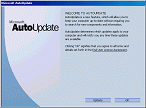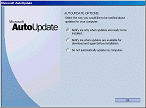One of the coolest new technologies in Windows Millennium Edition ("Windows Me") is AutoUpdate, which
allows you to keep your computer up-to-date without having to manually navigate to
the Windows Update Web site and see whether there's anything new. If you agree to
allow AutoUpdate to run on your system, it will occasionally go out and see whether
there are are new updates for your specific configuration. If there are, it can
be configured to automatically install them or alert you so that you can manually
decide whether the update is something you want installed.
AutoUpdate matures
AutoUpdate made its debut in the first external build after Millennium Beta 2, which was
released in late November 1999. As shown in these screenshots, the initial
attempt at an Activity Center user interface was a complete disaster. Microsoft
abandoned this user interface in later builds for a more elegant, and standard,
Windows API user interface.


Still, AutoUpdate was up and running, technologically, in November. And
despite security concerns--Microsoft is still smarting from the revelation that
it was gathering user information in online registrations for Windows 95 and Office 97--it's clearly
important for this future operating system to be able to update itself without
user intervention via the Internet.
AutoUpdate in Millennium Beta 2 Refresh
In the Beta 2 Refresh build of Millennium, which became available on
January 24, 2000, Microsoft walked away from the old Activity Center-style
interface, which clearly wasn't working, and "downgraded" AutoUpdate
to resemble a standard Windows application. Oddly enough, System Restore and the
Millennium online Help system will continue to use an HTML-based Activity Center
user interface, even in the final product apparently. While this will give users
a preview of the HTML-based user interface to come in "Whistler," the
next major revision to Windows, I think

